

Journal of Medical Sciences and Health
DOI: 10.46347/jmsh.2020.v06i03.001
Year: 2020, Volume: 6, Issue: 3, Pages: 1-6
Original Article
Aliya Nusrath1, T. A. Dhanalakshmi2, K. Amita3
1Professor and Head, Department of Biochemistry, Adichunchanagiri Institute of Medical Sciences, Mandya, Karnataka, India,
2Professor, Department of Microbiology, Adichunchanagiri Institute of Medical Sciences, Mandya, Karnataka, India,
3Professor, Department of Pathology, Adichunchanagiri Institute of Medical Sciences, Mandya, Karnataka, India
Address for correspondence:
Dr. Aliya Nusrath, Professor and Head, Department of Biochemistry, Adichunchanagiri Institute of Medical Sciences, B.G. Nagara - 571 448, Nagamangala, Mandya, Karnataka, India. Phone: +91-9448168236. E-mail: [email protected]
Objective: Even though research is the cornerstone of advancement in medicine, training in research during the undergraduate (UG) years is ignored in the current scenario of medical education. Hence, it is imperative to motivate UG medical students to take up research to train themselves and equally important is to create awareness of available platforms for UG research. The present study was undertaken to assess the effectiveness of orientation program designed to sensitize and motivate the medical students toward participation in Indian Council of Medical Research – Short-Term Studentship (ICMR – STS) program and to compare the awareness of medical students toward online registration and application process for ICMR – STS fellowship participation before and after this program.
Materials and Methods: A cross-sectional, questionnaire-based, and interventional study was conducted among the participants of an orientation program to sensitize the UGs regarding ICMR – STS program. The questionnaire was administered to the willing participants to collect information regarding the effectiveness of the program in motivating the students toward enrollment in ICMR-STS program and creating awareness of the timeline of registration and application process of this program. The data were entered in excel sheet and analyzed by descriptive statistics.
Results: Two hundred and fifty-two students participated in the study with the majority of the students perceiving research in medical field is important (98.75%) and UG students should be involved in research (91.25%). Even before the orientation program, 85% of the students were aware of ICMR- STS program with teachers (68.33%) being the major source of information. The awareness of online registration and application process for ICMR–STS fellowship improved significantly after the orientation program for all the timelines (P < 0.00001) except the timeline to submit the completed ICMR-STS report (P > 0.0.05). The willingness to enroll into ICMR-STS program improved significantly (P = 0.02) following the program.
Conclusions: The study demonstrated the positive attitude of students toward research and improvement in awareness of the online registration and application process toward ICMR-STS program. The orientation program was also responsible in motivating students to take up research under this program.
KEY WORDS:Biomedical research, medical students, orientation program, questionnaire.
Medicine is a dynamic branch of science with path breaking discoveries and innovations.[1] Physician- scientists play an essential role in biomedical research and the advancement of medicine.[2] Participation in research during undergraduation is believed to be important to become a better clinician or physician.[3]
Involvement in research requires a person to collect and compile information, analyze the information objectively and critically, and to conclude the information scientifically.[4] Exposure to scientific research promotes competencies such as critical thinking, logical reasoning, problem solving, lifelong learning, hypothesis formulation, results interpretation, and data communication. The involvement of students in research will help them gain these competencies which is important in clinical decision making thus improving patient care.[4,5]
In spite of this evidence, the MBBS curriculum does not have research component. The focus of medical education has shifted mainly toward service orientation rather than research based medical practice.[1,4] There has been a decline in medical professionals taking research as a career over the years due to a number of reasons.[2] There is an urgent need to encourage research skills and foster the analytical skill development among undergraduates (UG).[5]
In western countries, there is a growing trend to include scientific research training for UG.[6-8] In India, there are much less researchers when compared to global average with very less share in research output. In 2015, data show that there are only 216 researchers per million population with only 0.62% of GDP diverted toward research.[4,9] A number of reasons have been cited for the poor research such as lack of research infrastructure, poor funding, lack of structured mentorship program, and poor incentives for research.[4,10] Further the MBBS curriculum focuses on training, the UG to become only allopathic doctors without any training in research skills.[1,4] There are almost no formal training programs in research for medical UGs in India to become physician scientist.[4,5]
However, few programs like Indian Council of Medical research – Short-Term Studentship (ICMR- STS), “Kishore Vaigyanik Protsahan Yojana” encourage research aptitude among students.[4,10,11]
To motivate and nurture the inherent quest for Medical Science and Research among the doctors of tomorrow, ICMR has initiated a STS program in 1979. The STS program is exclusively for the UG students of medicine and dentistry in India and is for short duration of 2 months with stipend after successful completion of the project. The objective of this program is to sensitize the UG students in research methodology and techniques and motivate them to take up research in future.[12]
However, the students may not be aware of this fellowship program and even if aware may not be acquainted with proposal submission to ICMR resulting in low registration to this research promoting program.
An orientation program regarding ICMR – STS for UGs might generate awareness and motivate students to apply for this program. The teaching institute where this study was undertaken has been conducting orientation program regarding ICMR-STS from past couple of years to motivate and sensitize the medical (mainly 1st and 2nd MBBS) students for participation in research. The 2-h program consists of interactive lectures with the objectives of emphasizing the importance of research in medical field, role of students in research and the research avenues available in our country for UGs with major reference to ICMR-STS. At a later date the institute also organizes a research methodology workshop for those students who have registered for this program.
The present study was undertaken to assess the effectiveness of this orientation program designed to sensitize and motivate the medical students toward participation in ICMR – STS program and to compare the awareness of medical students toward online registration and application process for this program before and after the orientation program.
A cross-sectional, questionnaire based, and interventional study was conducted at a rural tertiary care medical institute following an orientation program regarding ICMR-STS program for UGs (for 1st and 2nd MBBS students).
The 2-h orientation program consists of interactive lectures with the objectives of emphasizing the importance of research in medical field, role of students in research, and the research avenues available in our country for UGs with major reference of ICMR-STS. During this program, the students were sensitized regarding scope and benefits of participations in ICMR-STS, the registration process, timeline of this program, etc.
Based on the content of the orientation program and review of literature, a semi structured questionnaire was developed to assess the effectiveness of this sensitizing program in motivating and creating awareness of medical students regarding research, ICMR – STS fellowship and knowledge of online registration and application process for this program. The questionnaire tool to assess the baseline knowledge (pretest) had 14 questions with the majority of questions having ternary responses (Yes/no/don’t know). Few questions had additional mixed ended questions with students needing to specify timeline. Similar questionnaire tool was used to assess the post-intervention knowledge (post- test questionnaire) with deletion of two baseline knowledge questions. The questionnaire tool was validated by expert peer review and by piloting on ten students. After incorporating the identified inconsistencies, the face and content validated questionnaire required 8–10 min to respond.
All the students of the program were invited to participate in the program after obtaining institutional ethical clearance. Two hundred and fifty-two students who consented to be part of the study were given pre-test questionnaire tool and the same set of students was given post-test questionnaire tool after completion of the program.
The data collected were entered into Excel Sheet and analyzed. Descriptive statistics were employed and results expressed as frequency and percentage. Chi square test was employed to compare the categorical variables and probability value of < 0.05 was considered as significant.
A questionnaire-based study was conducted with 252, 1st and 2nd MBBS students consenting and submitting filled pre-test questionnaire. Of these 12 questionnaires were incomplete and were not considered for analysis. After the orientation program, the same set of students submitted the filled post-test questionnaire of which ten were incomplete and hence 242 responses were analyzed. The mean age in years of the study participants was 18.34 ± 1.1 with 57.26% females and 42.74% males.
Before orientation program, almost all students (98.75%) student perceived, research in medical field is important and 91.25% students also felt UG students should be involved in research. Further after the orientation program, the perception of students about research in medical field and involvement of UG students in research rose to almost 100% and 99.17%, respectively, as shown in Table 1.
In the pre-test, the awareness among the students regarding STS-ICMR projects was 85% with teachers being major source of information, as shown in Figure 1.
Figure 2 compares the number of medical students giving affirmative (yes) response toward awareness of online registration and application process for ICMR–STS fellowship before and after the orientation program and the difference was very strongly significant for all items (P < 0.00001).
Table 2 compares the improvement in awareness of medical students toward online registration and application process for ICMR-STS fellowship after the orientation program which was very strongly significant for all items (P = 0.0002 to P < 0.00001) except for the parameter regarding awareness of submission of completed project dates (P > 0.05).
Following the orientation program, the willingness of students significantly improved (P = 0.02) toward participation in ICMR-STS program with 49.17% of students giving yes (willingness to participate) response in post-test compared to 37.92% in pre- test, as shown in Figure 3.
About 98.76% of students responded the orientation program on ICMR-STS as a useful program and 88.12% became aware of the impact of the ICMR-STS participation on improving their curriculum-vitae.
Research experience improves a person’s skill of systematically searching of information, critically appraising the medical literature and evidence- based medical practice. There should be an early integration of scientific research training in UG medical education as practice makes perfect.[5]
In the present study even before the orientation program, majority of the students perceived research in medicine field is important (98.75%) and UG students should be involved in research (91.25%).
Certain other studies also have reported positive attitude of students toward research.[6,13] A study by Noorelahi et al. reported 70% of medical students agreeing or totally agreeing that role of research in medical field and conducting research in medical school is important as well as patient outcome improves with continued medical research.[14]
In the present study, the students were further motivated after the lecture presentation with perception of students toward involvement in UG research program rising to 99.17%.
As shown in Table 1, 98% of students also felt it is important for medical students to know about research methodology which slightly improved to 98.33% following the orientation program. In this tertiary care institute, a separate workshop on research methodology is conducted for those students who have registered for the UG research programs at a later stage so as to improve their proposal writing protocol as well to train them in basic research methodology. Short duration mobile workshops conducted for educating graduate medical students in basic research methodology has been found to be effective with students giving positive feedback for such type of programs.[15]
In this study, a large number of students were aware of ICMR-STS program (85%) with teachers being the major source of information (68.33%). The institute during its induction program for freshly joined graduates sensitizes the students with the importance of research in medical field and announces the platforms available for conduction of research which is further reinforced at the departmental level orientation programs. Hence, the medical students at our institute have good awareness of research programs available to them. Similarly, in another study, initial source of information about ICMR-STS was announcement of faculty in class room.[11]
Even though the students were aware of ICMR-STS program, but the majority of them were unaware of the online registration process before sensitization program. This awareness improved significantly following the orientation program with P < 0.00001 for all parameters of online registration and research proposal submission, as shown in Figure 2. The majority of the students became aware of the correct timeline of online registration and application process for ICMR-STS fellowship after the orientation program, as shown in Table2. This shows the importance of creating awareness programs as the famous quote goes “what mind does not know, eyes cannot see.” Even if the students are motivated to pursue research and if are unaware of the research programs available to them and its importance in patient care they may find research irrelevant.[6]
Data show that only a small percentage of students (4%) are motivated to take research; hence, it is important to not only create awareness but also motivate the students to take up research.[15] In this study, following orientation program, the willingness to takes up ICMR-STS program significantly improved (P = 0.02), as shown in Figure 3.
In the present study, most of students felt the orientation program on ICMR-STS as a useful program (98.76%) which probably will motivate them to take up this short research program.
Research experience has an impact on curriculum- vitae of the students for pursuing their future academic endeavor and this point was stressed in orientation program which was reflected in the post-test response where 88.12% became aware of the research participation to improve their curriculum-vitae.
The attitudes of UGs toward research depends on previous training skills, motivation by faculty, and rewarding environment of institution.[13] Many studies have demonstrated improvement in attitude of UG medical students following short research training programs.[3,7,8] Gore et al. studied the impact of STS-ICMR program on attitude of UG medical students toward research. They reported that 94.3% of the study participants were in favor of redoing research projects in future.[11]
Our study had many limitations like small sample size, response recorded was only immediate outcomes of the program, whether the motivated students definitely enrolled for ICMR-STS program for the year were not assessed.
The authors propose to continue the investigation in this area to study the long-term outcomes of this program and whether the involvement of the students in research has any effects on the research attitude of these students in their future career.
The present study investigated the effects of an orientation program on the attitude and knowledge of the students toward enrolment in ICMR-STS program conducted by Indian Medical Council of Research in India for UG medical and dental students. The study demonstrated the positive attitude of students toward research and improvement in awareness of the online registration and application process toward this short-term fellowship in research as well as motivation of students to take up research under this program following the orientation program.
To encourage research among UGs, it is not only important to create awareness about the importance of research in medical field but also sensitize the students regarding the available platforms for research especially keeping in view of already resource constrain for research in our country.
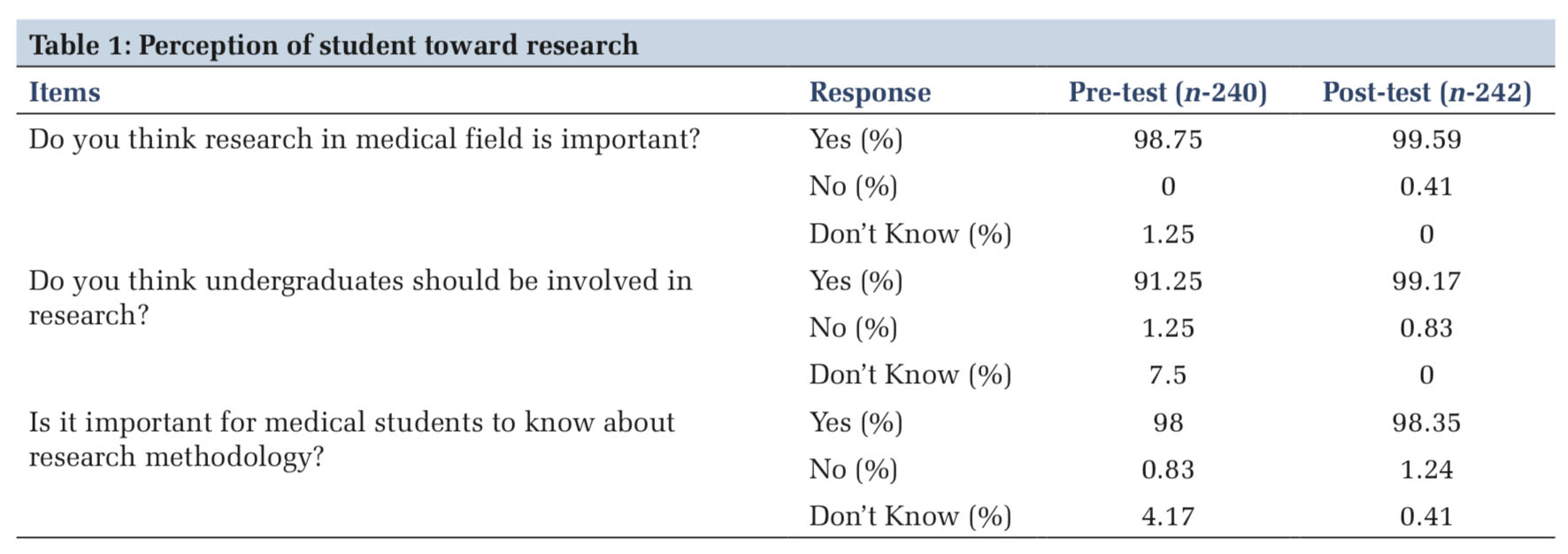
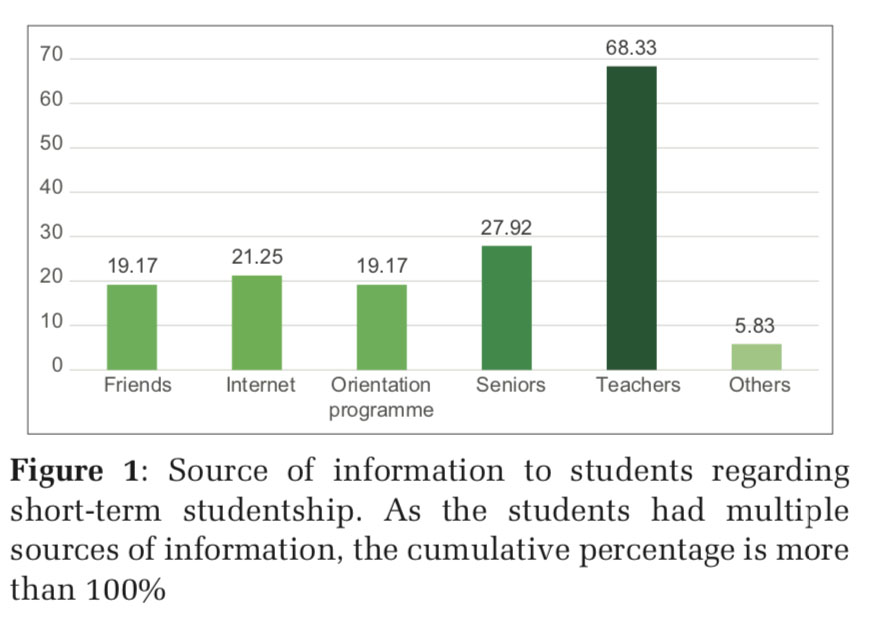
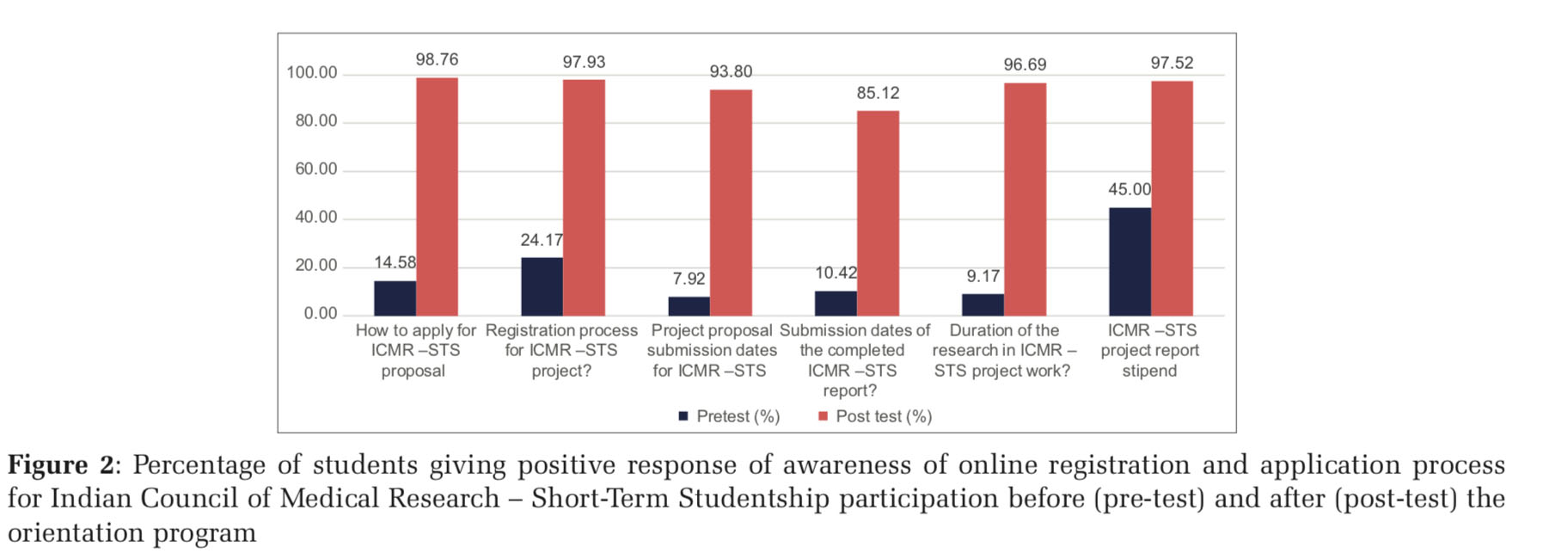
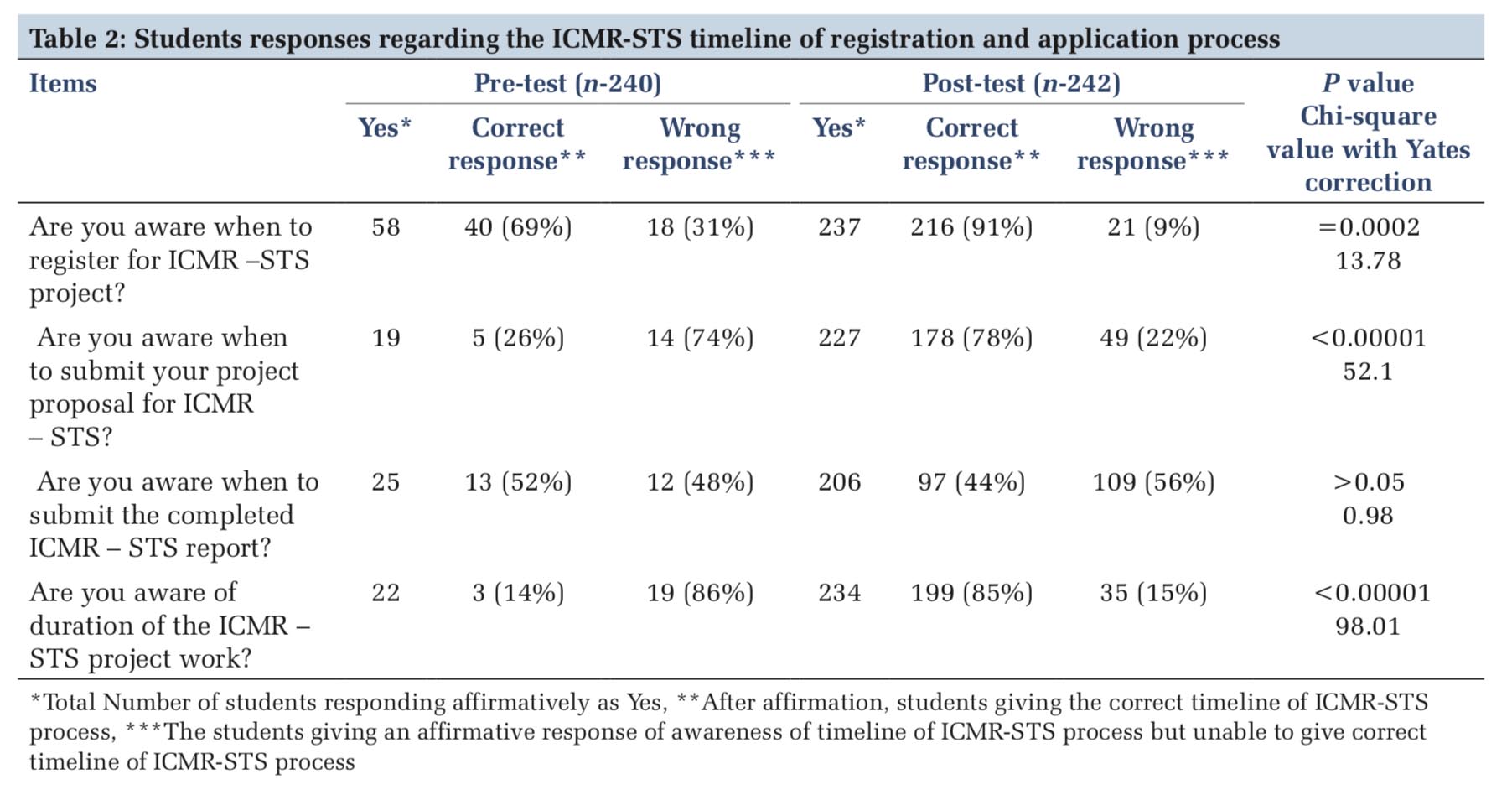
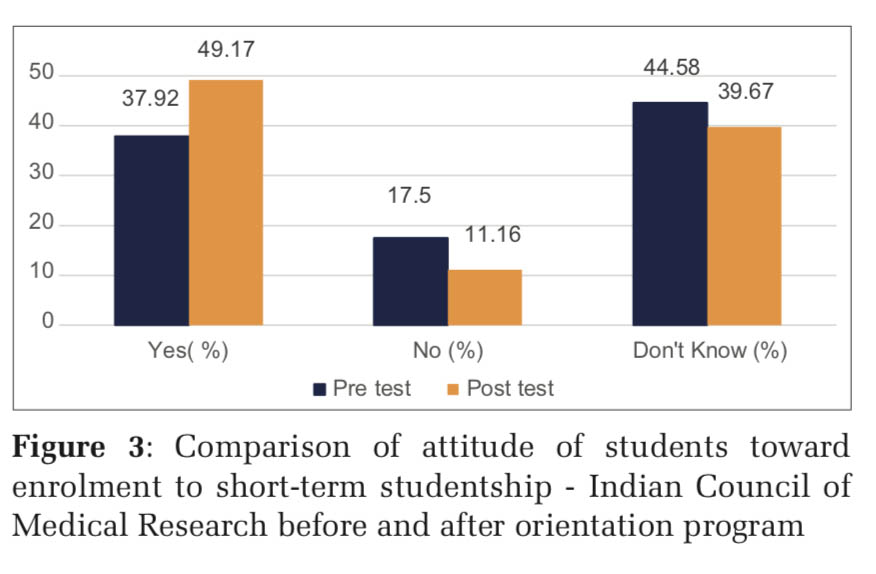
We thank all the UG students who have participated in the study and we are grateful to Mrs Varalakshmi who helped in data entry
Nil
Subscribe now for latest articles and news.